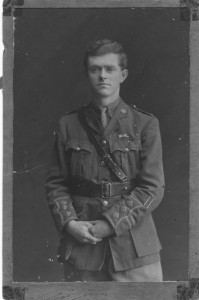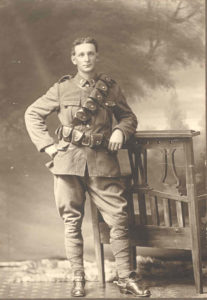Ever since I won the negative in a debate at school on the topic “that Anzac Day was the birth of modern Australia”, I’ve struggled to decide what I think of Anzac Day. Ultimately I would like it to be a day that is a day of remembrance, that makes it easier to remember all of the victims of war around the world, without any jingoism. A day of reflection and memory.

I’ve previously blogged about two of my Anzac relatives – my grandfather, who came back from World War I mostly unscathed, but having seen some pretty horrendous battles on the Western Front, and his cousin, who died in 1917 near Jerusalem. I love the way in which my family comes together to remember them and other soldiers on this day of remembrance.

But my family also has other relatives, from other parts of that great conflict. My husband’s great uncle (and namesake) fought on the Allied side – he was Scottish, and died very young on his return. My husband’s grandfather was a Croatian officer, who fought for the Austro-Hungarian army, in Italy.
An increasing number of Australians have family histories like this. Their ancestors come from both sides or none of the great European and Asian wars. Australia is a land with people from everywhere in the world, and Anzac day is increasingly irrelevant to the very many Australians without a personal connection to the wars and battles in those wars that are commemorated, or those whose personal connection comes from the other side.
The Anzac Day commemorations, as personal memories of the horrors of war fade, still largely commemorate that narrow group of ancestors who fought for Australia a long time ago.
Anzac Day used to be, at its best, a day that remembered the stupidity and futility of war, as well as recognising the sacrifices of those who fought and died, regardless of whether the fighting was sensible. And this year, as the ceremonies have necessarily been private, and local, it has been much more like that again – a day without jingoistic patriotism, a day of remembrance, that makes it easier to remember all of the victims of war. It helps us to remember that war is horrible, and destroys so many lives, not just those who are killed.


It’s funny I too had two grandfathers in the First World War. Given my lineage they were both English and fought the Germans so in a sense it feels removed from my every day.
I have as an Australian conflicted feelings about our involvement in the First World War. The rank stupidity of the British use of the Anzacs. Being a regular visitor to the imperial war museum when I lived in London the lack of recognition of our contribution was saddening to say the least.
With this year representing the 75th anniversary of the end of the Second World War it is though, I feel critical to NEVER forget how without being trite or jingoistic, just how close we got to a very different and dark world.
Dear Jennifer,
You expressed my sentiments so well. The older I grow, the more precious life of another
human being becomes. I do have an issue with religions (all of them) a casus belli for a lot of wars.
We will leave this subject when we next meet whenever.
Any special cupcakes for Anzac Day
Love Marta
Hi Jennifer,
Thanks for articulating the ANZAC spirit so well.
This is just how I feel: it is the senselessness of war that necessitates the need to mourn and memorialize all those who were involved.
Ordinary lives were irrevocably changed by war. We see what happened in Kokoda PNG; a battle field barely talked about but where a band of pretty much untrained soldiers fought to maintain Australian sovereignty. Lest We Forget.